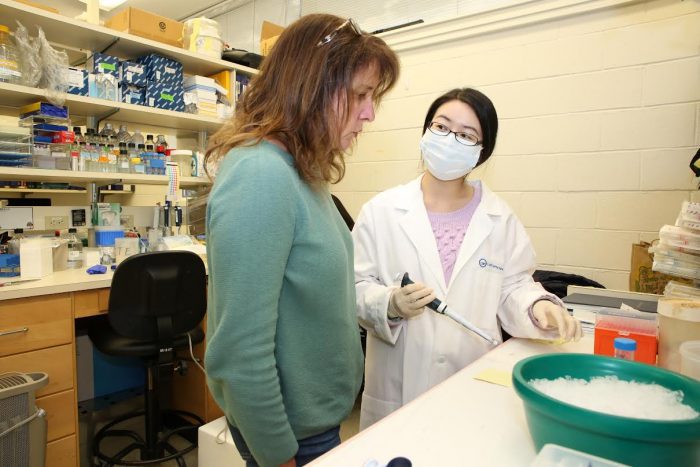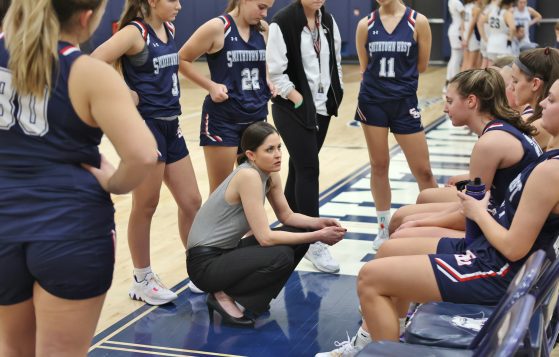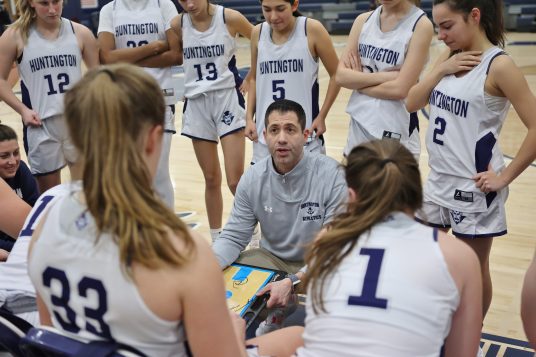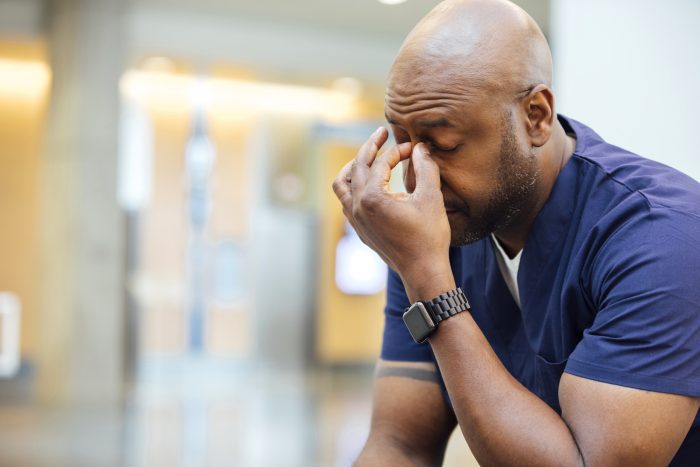By Daniel Dunaief
People have natural defenses against cancer. Proteins like P53 search for unwelcome and unhealthy developments.
Sometimes, mutations in P53, which is known as the “guardian of the genome,” rob the protein of its tumor fighting ability. In more than seven out of ten cases, the brain tumor glioblastoma, which has a grim prognosis for people who develop it, has an intact P53 protein.
So what happened to P53 and why isn’t it performing its task?
That’s what Cold Spring Harbor Laboratory Professor and Cancer Center member Alea Mills and postdoctoral researcher Xueqin “Sherine” Sun wanted to know.
Starting with the idea that something epigenetic was somehow blocking P53, Sun conducted numerous detailed experiments with the gene editing tool CRISPR-Cas9.
She knocked out parts of the chromatin regulating machinery, which determines whether factors for DNA replication, gene expression, and the repair of DNA damage can access genes and perform their tasks.
The researchers wanted to find “something specific to glioblastoma,” Mills said in an interview. Working with a team of researchers in Mills’s lab, Sun focused on the protein BRD8.
In experiments with mice, Sun and her colleague inhibited this specific protein by destroying the gene that encodes it. That step was enough to stop the tumor from growing and allowed the mouse to live longer.
Mills and Sun published their work in the prestigious journal Nature just before the holidays.
The article generated considerable buzz in the scientific community, where it was in the 99th percentile among those published at the same time in attracting attention and downloads. It also attracted attention on social media platforms like Twitter and LinkedIn.
“We see this as a major discovery, and are not surprised that many others think that the impact is extraordinary,” Mills said. The paper “has the potential of having a significant impact in the future. The work is completely novel.”
While finding a connection between BRD8 and glioblastoma suggests a target for researchers to consider in their search for new glioblastoma treatments, a potential new approach for patients could be a long way off.
“We cannot predict how long it will take to be able to help patients” who have glioblastoma, Mills said.
A promising step
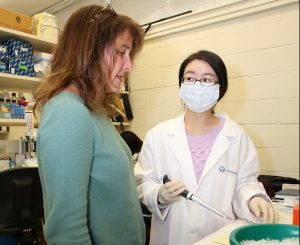
Still, this finding provides a promising step by showing how knocking out the BRD8 protein can enable P53 to gain access to a life threatening tumor.
Sun and Mills said BRD8 and its partners lock down genes that are normally turned on by P53.
“What you inherit from mom and dad is one thing,” said Mills. “How it’s packaged, the epigenetic mechanism that keeps it wrapped up or open, is key in how it’s all carried out within your body.”
By targeting BRD8, Mills and her team opened the chromatin, so P53 could bind and turn on other cancer fighting genes.
After receiving patient samples from Northwell Health, Stanford and the Mayo Clinic, the team studied tissue samples from patients battling glioblastoma. Those patients, they found, had higher concentrations of BRD8 than people without brain cancer.
Researchers and, down the road, pharmaceutical companies and doctors, are careful to make sure removing or reducing the concentration of any protein doesn’t have so-called “off target effects,” which would interfere with normal, healthy processes in cells.
Mills said they tested such actions in the context of neural stem cells in the brain. At this point, removing BRD8 didn’t have any “deleterious consequence,” she said.
Her lab is working to see the effect of reducing or removing the mouse version, also called Brd8, during development by engineering mice that lack this protein.
Future research
An important next step in this research involves searching for and developing viable inhibitors of the BRD8 protein.
For histone readers like BRD8, researchers look for an active domain within the protein. The goal is to interrupt the interface in their interactions with histones.
In creating molecules that can block the action of a protein, researchers often start with the structure of the protein or, more specifically, the active site.
Sun, who is currently applying for jobs to run her own lab after working at Cold Spring Harbor Laboratory for over eight years, is hoping to purify enough of the protein and determine its structure.
Sun is working on x-ray crystallography, in which she purifies the protein, crystallizes it and then uses x-rays to determine the atomic structure.
Sun described the search for the structure of the protein as an “important direction” in the research. “Once we solve the structure” researchers can focus on drug design, testing and other experiments.
She suggested that the search for a small molecule or compound that might prove effective in inhibiting BRD8 would involve optimizing efficiency and activity.
There is a “long way to go” in that search, Sun added.
She is working to generate a chemical compound in collaboration with other groups.
A long, productive journey
Born and raised in China, Sun has been an active and important contributor to Mills’s lab.
“I’ll miss [Sun] personally as well as in the lab,” Mills said. “She’s been a really good role model and teacher across the Cold Spring Harbor campus and in my lab.”
Mills is “really excited about [Sun’s] future,” she said. “She’ll be really great” at running her own lab.”
For her part, Sun enjoyed her time on Long Island, where she appreciated the natural environment and the supportive culture at Cold Spring Harbor Laboratory.
Sun described her time on Long Island as a “very exciting and satisfying journey.”
She is determined to study and understand cancer for a number of reasons.
“I know people who died of cancer,” she said. “It’s a terrible disease and it’s urgent to find more efficient therapeutic strategies to stop cancers and improve human heath.”
Sun is also eager to embrace the opportunity to mentor and inspire other students of science.
“Teaching is very important,” she said. She looks forward to helping students grow as professionals to create the “next generation of scientists.”

